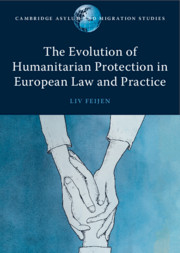Book contents
- The Evolution of Humanitarian Protection in European Law and Practice
- Cambridge Asylum and Migration Studies
- The Evolution of Humanitarian Protection in European Law and Practice
- Copyright page
- Dedication
- Contents
- Preface
- Table of Cases
- Abbreviations
- Introduction
- 1 The Ethical Dimension of Immigration Policies
- 2 Humanitarian Considerations and the Institution of Asylum
- 3 Humanitarian Protection or Human Rights Protection?
- 4 A Solution for Persons with Other Protection Needs
- 5 From an Act of Charity towards a Legal Obligation?
- Conclusion
- Select Bibliography
- Index
5 - From an Act of Charity towards a Legal Obligation?
Published online by Cambridge University Press: 16 March 2021
- The Evolution of Humanitarian Protection in European Law and Practice
- Cambridge Asylum and Migration Studies
- The Evolution of Humanitarian Protection in European Law and Practice
- Copyright page
- Dedication
- Contents
- Preface
- Table of Cases
- Abbreviations
- Introduction
- 1 The Ethical Dimension of Immigration Policies
- 2 Humanitarian Considerations and the Institution of Asylum
- 3 Humanitarian Protection or Human Rights Protection?
- 4 A Solution for Persons with Other Protection Needs
- 5 From an Act of Charity towards a Legal Obligation?
- Conclusion
- Select Bibliography
- Index
Summary
The humanitarian argument, although it has proven to be very steadfast, is ultimately discretionary and therefore not guided by the qualities associated with the rule of law, such as accountability and transparency. The practice of inhibiting returns or allowing persons to remain on humanitarian grounds starting with ad hoc amnesties and regularization programmes has evolved in many countries into individual assessments of needs based on pre-determined criteria. The case law of the Strasbourg Court has contributed the to harmonization of the criteria of some of the categories previously receiving humanitarian protection through an inclusive interpretation of the European Convention on Human Rights. This chapter discusses whether the current protection mechanisms are sufficient or whether a tertiary protection status should be considered.
- Type
- Chapter
- Information
- Publisher: Cambridge University PressPrint publication year: 2021

